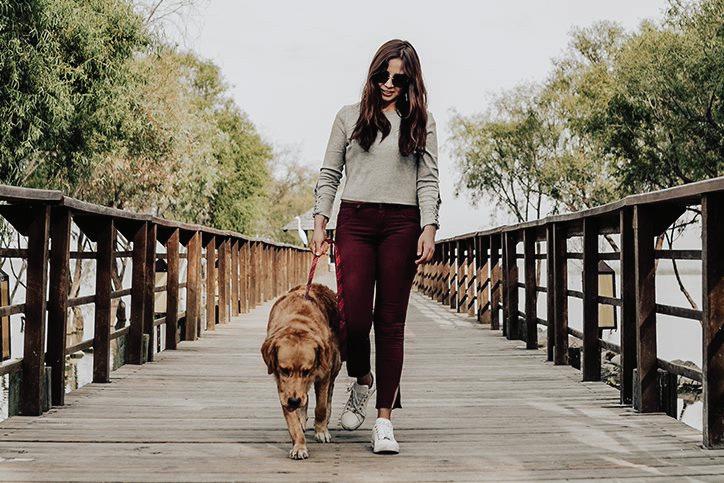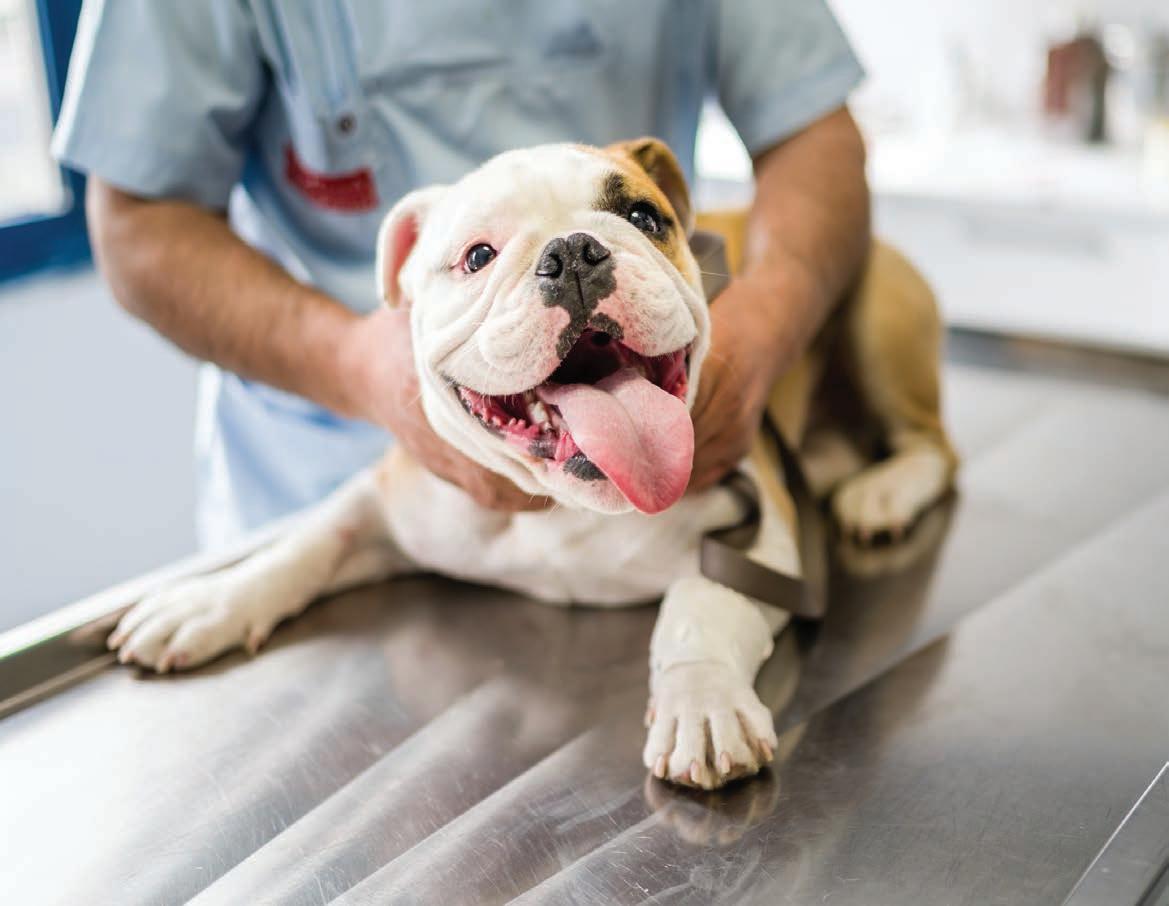






the very best for your dog
True Origin™ premium dog food & snacks contain only real ingredients with no fillers.

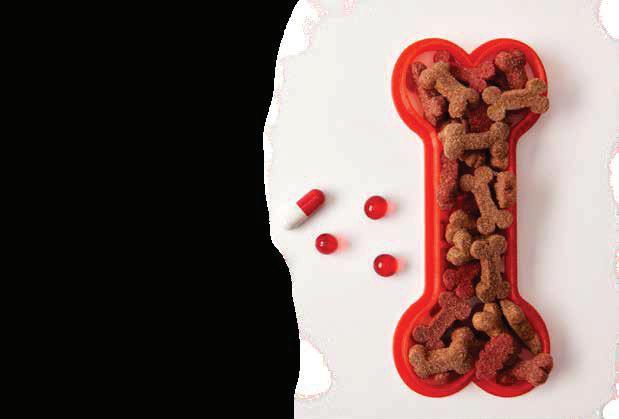

No Corn, Wheat or Soy
No Corn, Wheat or Soy
No Artificial Preservatives
No Artificial Preservatives
No Artificial Flavors
No Artificial Flavors
AVAILABLE EXCLUSIVELY AT
AVAILABLE EXCLUSIVELY AT
Discover more food, snacks & toys from hundreds of national
Discover more food, snacks & toys from hundreds of national brands in our pet aisle!
the very best for your dog
—for less!
True Origin & snacks contain only real ingredients with no fillers.
AVAILABLE
pet medications
Looking for something we don’t carry in-store? Browse meds, specialty food & more for your furry family members.
• Earn perks on your purchases that add up to FREE gas & groceries
• Earn perks on your purchases that add up to FREE gas & groceries
• Get FREE shipping to your home on purchases of $49+
• Get FREE shipping to your home on purchases of $49+
SCAN TO SHOP or visit GiantEaglePetRx.com
SCAN TO SHOP or visit GiantEaglePetRx.com
pet medications
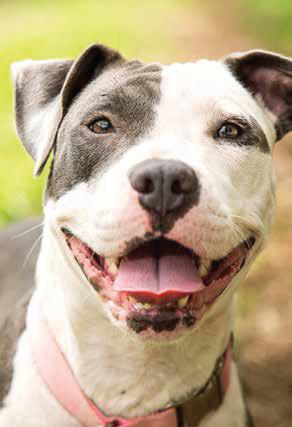
• Earn perks on your purchases that add up to FREE gas & groceries
SCAN TO SHOP or visit GiantEaglePetRx.com

Kim Lenz started looking into riding after a friend got a foster horse. “They were a love of mine since I was kid, but I couldn’t have one because my dad was allergic,” she explains. “I found someplace that would let me ride their horses so I didn’t need to have my own.” She took riding lessons for about 8 months then started leasing a quarter horse named Harley, which allows for partial responsibilities of the horse and unlimited riding. Kim took care of things like his feet and vetting, while the owners covered feed and housing. “I tried to buy him,” she laments, “but the owners loved him just as much.”
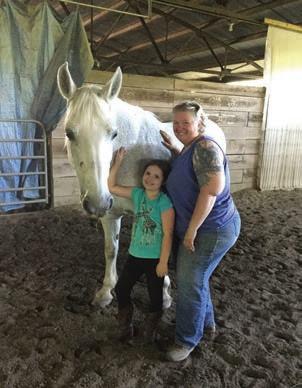

One day her friend Julie called her about a horse she was showing to another riding client, and Kim drove out to meet the horse. “She wasn’t technically pretty in the way horse buyers like to see but to me, she was beautiful,” Kim remembers. Angel, as she came to be known, showed almost no interest in the woman that was there to see her and instead began following Kim around. She came out of the barn and went straight to Kim. At the time, Lenz had only gone to look at the horse and wasn’t able to purchase her because of the price, but the owner saw the spark between them and worked with Kim to make sure they were paired, and Angel became the love of her life.
“Just being around horses started to bring me out of my shell, but I felt an immediate and incredible bond with Angel. She gave me a lot of confidence to believe in myself.” As with so many of us, a difficult early life and insecurities had led her to feel smaller and quieter than she would have liked. Angel became the catalyst for her to move forward and blossom. Spending time at the barn brought her into a circle of people she had something in common with and her social wheels started turning. “I never thought I could do the things I’ve done looking back without Angel by my side.”
Angel and Kim were together for 9 years until a terrible accident. The owner of the barn Angel was kept at was unclear about the weather one night and left the horses out in a thunderstorm with the electric fence turned on. A bolt of lightning hit the fence and traveled to Angel, who was standing next to it. The next morning as Kim drove to the barn to greet her, she saw her beloved horse collapsed in the
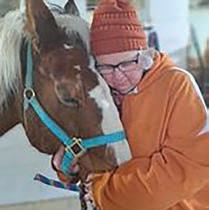
corral. “I saw her on the ground and my stomach went to my throat. Finding her like that was heartbreaking,” she shares. The day after, she thought she would never recover. Her friends urged her to come back to the barn and continue to work around the other horses to keep her going. So did, and as one day turned into the next, she started to heal and 3 months later she found her current horse, Luna. “That brought me to a point where I finally was ready for another horse. Working around the barn and not having my own horse was too hard.” She smiles and a small light comes to her eyes. Her bond with Luna is a little different, she explains. “Angel was an in your face horse, with a lot of emotion. We had an instant connection. Luna took some time.” The later had been trained as a workhorse by a man and wasn’t as outgoing as her other horse was right away. But they worked at it, and after about 3 months of constant love and patience she came around. “She was well taken care of, but not loved on, or petted and shown a ton of affection so all that was new to her.” Kim has owned Luna for 4 yeas now, and now loves to follow Kim around. “The first time I saw her, she was tied to a post but pulled toward me a little; that was the first indication that there was something deeper in her we could work towards.”
Kim recommends that anyone interested in horses find a riding barn, where they can take introductory lessons to learn more about English or Western riding or just learn to be around horses. And kids may be interested in 4H where they can be around a great variety of animals. “Horses are very therapeutic; they can read emotions very well. So for anyone struggling or grieving, being around them can help,” she says, noting her own experiences. She suggests googling therapeutic barns in your area, noting she visited one specifically for veterans. She described how comforting Angel was to her when one day a family tragedy struck. “I went to the barn and she immediately rested her head on my back and gave me a giant horse hug.” And who wouldn’t benefit from that.
While horses can be expensive and time consuming, Kim believes it’s all worth it. “I could never be where I am today without one in my life.”



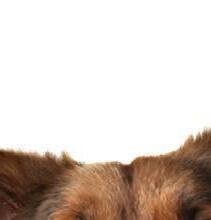

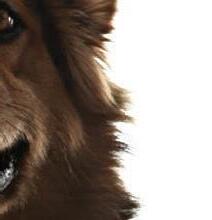
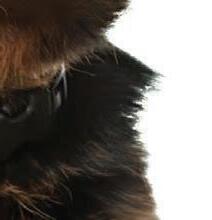
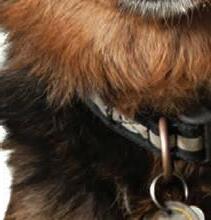

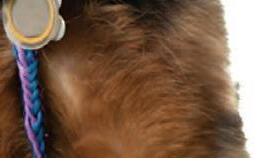


























































Sept 23rd
Black Tie and Tails

Sept 20th
Humane Animal Rescue
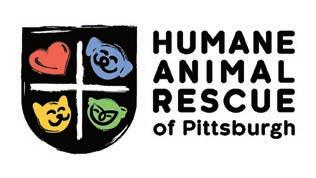

Pups & Pints
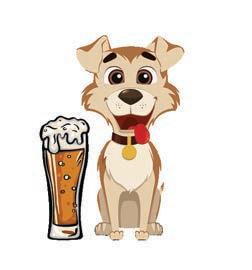
Sept 27th
Beaver County Humane Society

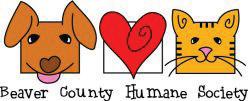


Wags & Whiskers
Oct 7th
Dogtoberfest

Sponsored by
September 29, 2023
Speaker: Andreas Tanke
Saturday, June 3, 2023 12p-4p
Garden City Banquet Hall
600 Garden City Drive
Monroeville, Pa. 15146
The already dog friendly The Waterfront in Homestead opened a green spot for shoppers with dogs to relax and let their pets take a break: a new dog park. “It’s been in the planning since fall of last year,” explains Emily Wittmer, Marketing Director at the Waterfront. The large grassy area features several agility structures to play on and jump through, and a refillable dog pool connected to a water source inside the park along with benches for less activity inclined owners to sit while supervising their dogs. The park is open to the public without any membership fees or reservations necessary. For now, the hours are 24/7, with waterfront security just across the sidewalk and the area well lit, giving owners an option to come during off hours if they have a pet that prefers less crowded play. The dog park is conveniently located across from the bathrooms right at the pedestrian bridge. “Most of the stores in town square are dog friendly,” according to Emily, making area even more enticing for pet owners to shop.



Opening day featured Skye and Chase from Paw Patrol entertaining kids, Puppichinos from Starbucks and several vendors. Animal Lifeline was the highlighted dog rescue group, and was on-site accepting
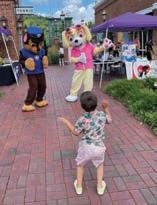
food and animal supplies. Along with promoting spay & neuter, they provide transportation for help to reach those in need. https://www.animallifelinepgh.org/
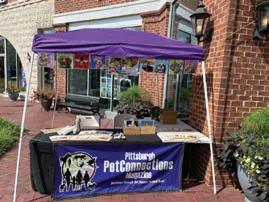

The park had a few owner and dog team trying out the park as soon as it was open. “We just came down today because one of our neighbors told us about it,” says Layne Gable. “We live pretty close and enjoy shopping at the Waterfront, and now we have a place for Bean to go, too”.
Joe Potosnak saw the park opening on the news and came from Monroeville to check it out. He brought his 5-month-old foster dog Lucy, a German shepherd, to spend some puppy energy and to try out some of the agility equipment with her. Lucy will be going to a disabled veteran when she’s full trained as part of Gunny’s Ridge non-profit. Their goal is “to provide a private and natural environment for both Veterans and First Responders to bond through engagement in recreational, educational, and physical programs” according to the web site https://www.gunnysridge.org/
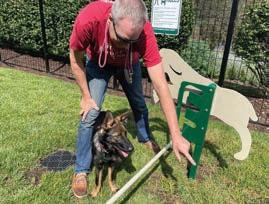
The hardest behavior to teach a dog, in my opinion, is loose leash walking. Many people start at the end of the behavior, which is holding the leash at its handle and not using two hands to guide the dog on their journey. I see many allowing the dog to switch sides which can cause humans to trip up. I also see dogs suddenly jerk their handlers to go sniff, or to lunge at other dogs, sometimes in a friendly manner, and sometimes not so friendly. This can be unsafe for both humans and dogs alike. Using a light hand and cues are required to enjoy your walk. After all, isn’t that part of the walk? Walking is for both the human and the dog. Walking erratically is not all that fun for humans. It is one of the biggest complaint people have.
How do we get a safe enjoyable walk? It takes time and information. The dog has the time, but not the information it needs to give the human the behavior they are asking for. Humans need to make the time and learn how to communicate their needs to their dog. It doesn’t work if there is no connection. In this article, I am going to break down the skills the dog team needs to walk nicely together.
Learning how to use a clicker is very helpful in communicating with your dog. It is simple to use, but there is a procedure, and it needs to be done correctly for it to be an effective tool. Click, means food is coming and you like that body movement. You are asking your dog to do that body movement in the moment it is happening. Click and treat repeatedly until he gets the movement you are looking for. To start, take about 20 treats, click, and treat within a ½ a second of click. This helps the dog understand that when he perceives this signal, that food is quickly coming. Always give the dog a treat after a click, no mater what. If your phone dings and you know that ding means money hits your account, how do you feel? If you don’t use the clicker, you will want a conditioned word. Yes, good, yup are some examples. This is also effective. I use “yes” when not using a clicker. You can find clicker tutorials on YouTube.
Next, is your eye contact. How will your dog know you are talking to him if he is not paying atention? Stand in front of your dog. Your hands are at your side, clicker and treats in your hand. Be aware the dog might try and mug your hand; don’t cave, they are yours until you give them to him. Wait until he looks at you, and makes eye
contact, then click and treat. Continue for a few minutes. Start adding a kissy mouth noise or dogs name to your behavior. Put the treat on the ground, use your cue, kissy for instance, when dog looks click and treat. Do this exercise several times a day for a few minutes. Then a few times a week then a few times a month to keep it strong. You can pick a certain number of treats for each session to use until gone, say 10 treats. This will keep your sessions short, sweet, and you on track.
Targeting is the second behavior I like to get strong before I start my leash training. This teaches a dog to target my hand or an object. This allows me to move my dog from one position to another without touching the dog. Another use for the touch cue is to redirect your dog’s atention. One can use the touch cue to distract the dog from something he might bark at on a walk or while you are at home. For example, you could distract your dog from another dog when you are on a walk. When your dog starts to react, you tell him “Touch,” and he will focus on you instead.

Then finally, atention heeling. Teaching the dog to follow me at my preferred side is where I start my walking behavior. Starting at your preferred side, and then getting your dog’s atention you have goten strong. Ask your dog “are you ready?” This is an informational cue. You are asking your dog to prepare to learn and to focus. Without putting a leash on your dog, take a step, click, and treat when dog’s nose hits your pant seam. Continue until your dog gets the idea and then start adding steps and directions. Do
circles, weaves, and U-turns. When you believe the dog understands that the best place to be is your side then add your leash to the picture. Again, start at the beginning. I like to use hallways for training my leash skills. If my dog has a wall to guide him, it helps keep him on my preferred side. I always start leash training off the leash first.
The key is to teach your dog to focus on you and follow you where you lead him without pulling. Starting at the beginning is very important, otherwise how will the dog know that you need him to walk nicely for you? Remember the walk is the end of the behavior not the beginning. Most importantly have fun, make sure the dog is having fun. You’ll get there!
For further help check out my YouTube channel. htps:// www.youtube.com/paulasdogservices




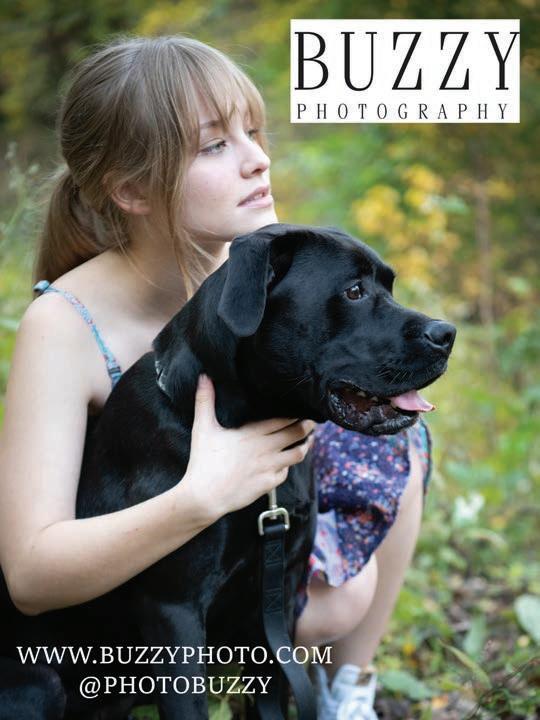


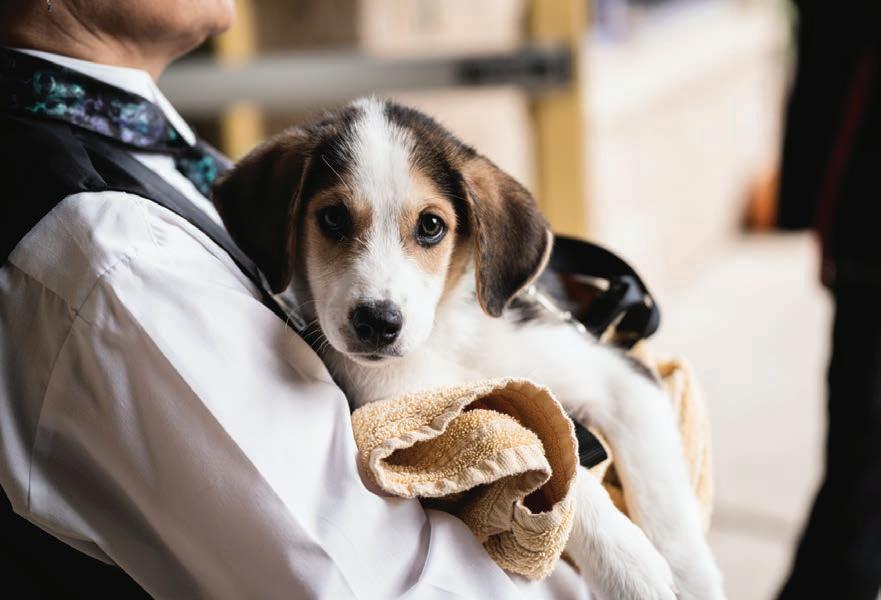
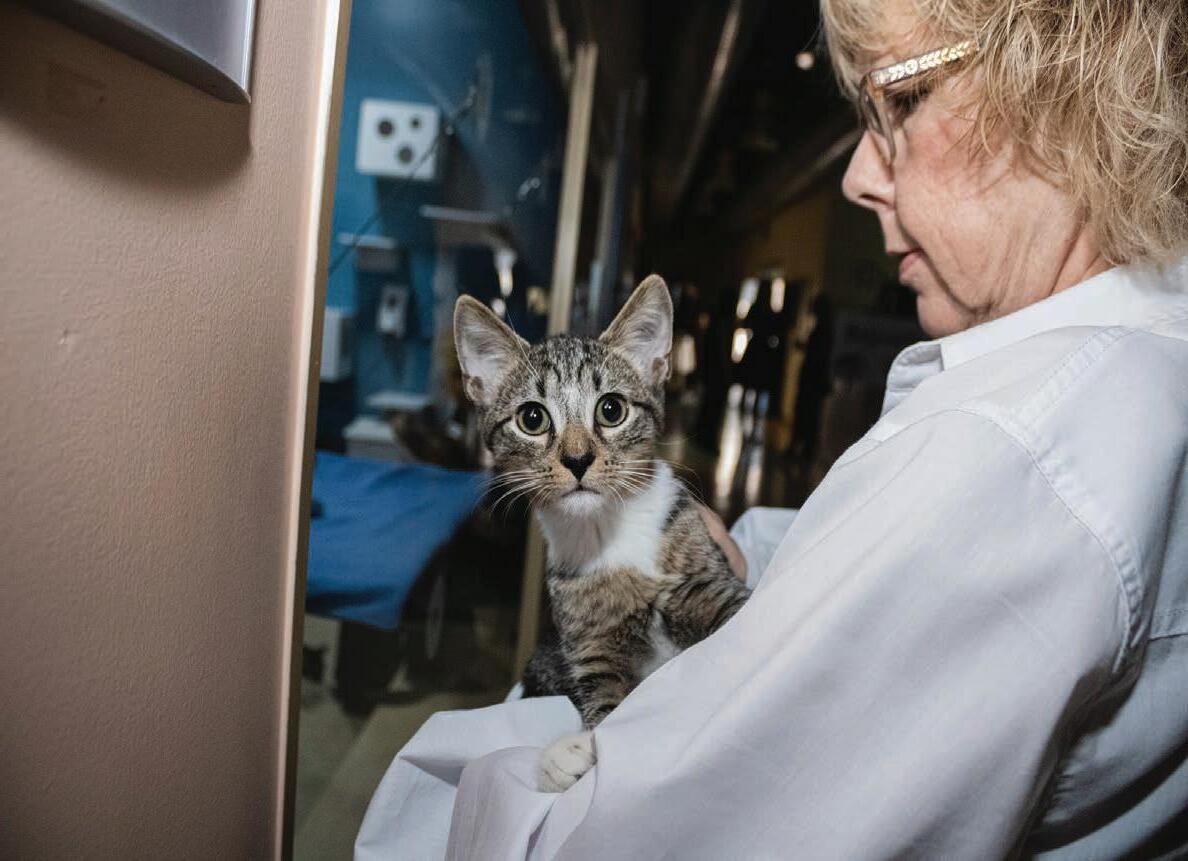



Saturday, Sept. 23



We have some big surprises up our sleeve as we celebrate our 80th birthday at Pittsburgh’s most playful gala, featuring the best party animals in town ... our dog, cat and rabbit residents. We promise, this is one you won’t want to miss!





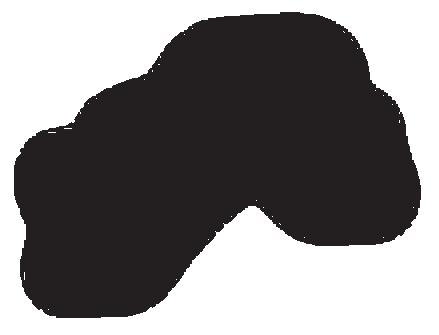


Scan the code to learn more or visit ThinkingOutsideTheCage.org/BTT.


We help We help thousands of animals get off the streets and into loving homes every year. thousands of animals get off the streets and into loving homes every year.


We save We save animals from hoarding and other cruelty-related situations. animals from hoarding and other cruelty-related situations. We provide We provide animals with life-saving medical care. animals with life-saving medical care.

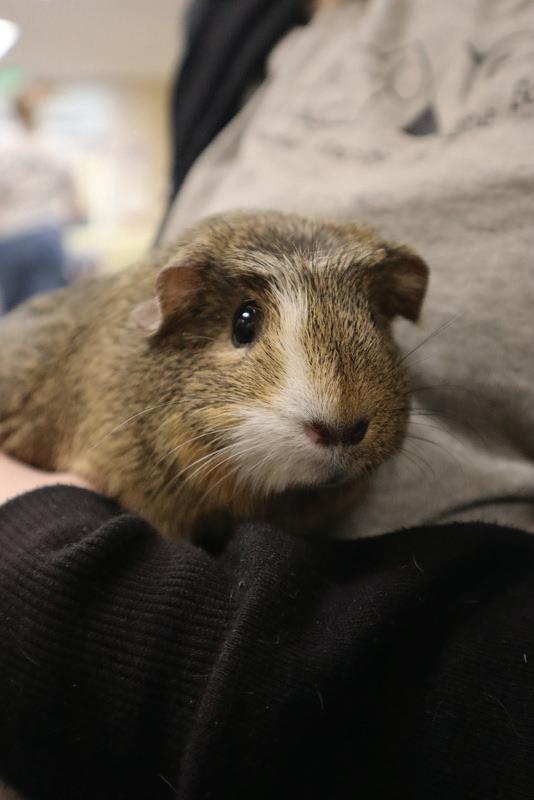
Adopt a shelter pet and get a lifetime
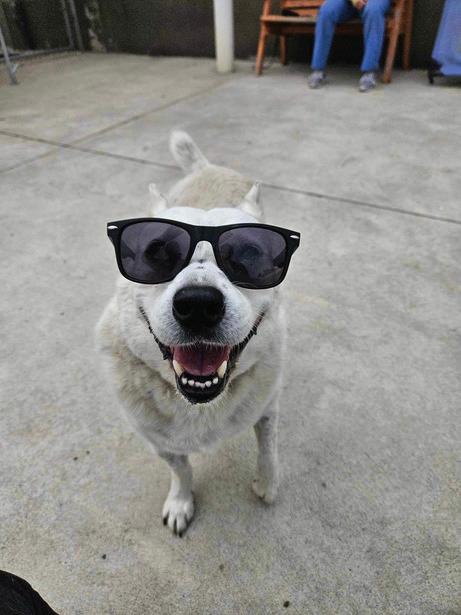
Adopt a shelter pet and get a lifetime of unconditional love! of unconditional love!
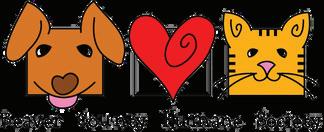
Since 1950, BCHS has been providing: Since 1950, BCHS has been providing:
Adoption Services Adoption Services
Senior 2 Senior Adoption Program Senior 2 Senior Adoption Program
Cruelty Investigations Cruelty Investigations
Education Programs Education Programs
Pet Food Pantry Pet Food Pantry
Thrift Store (Located in Beaver Falls) Thrift Store (Located in Beaver Falls)
Trap-Neuter-Release (TNR) Services Trap-Neuter-Release (TNR) Services
Low Cost Vaccine & Microchip Clinics
Low Cost Vaccine & Microchip Clinics

Low Cost Feline Spay/Neuter Clinics
Low Cost Feline Spay/Neuter Clinics
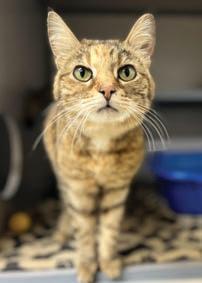
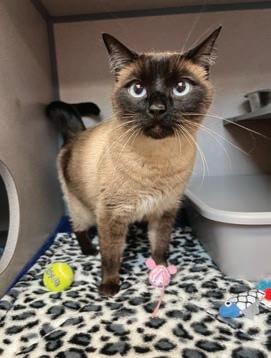
Volunteer Program Volunteer Program And much more! And much more!
Follow us on: Follow us on:

A Healthier home for your family every day, including your pets!
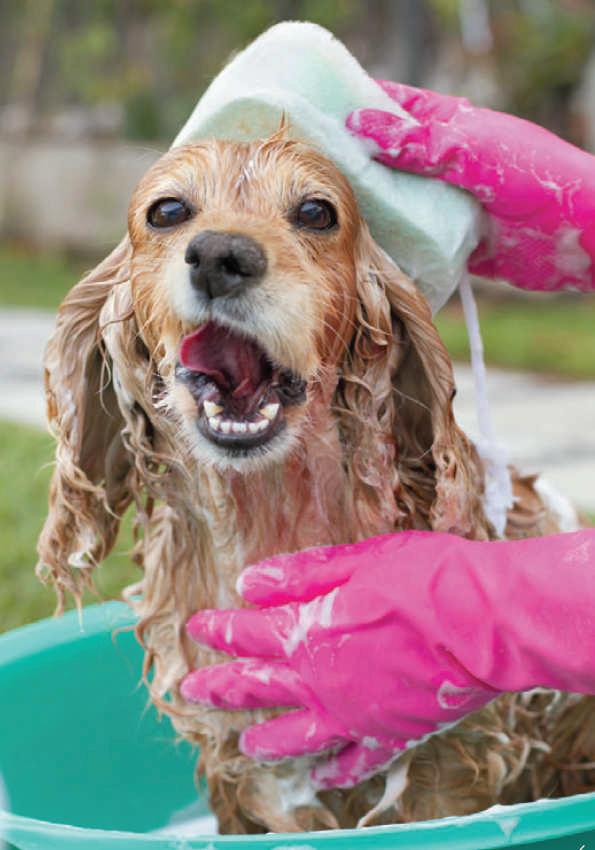
Call Bartman Plumbing at (724) 258-9125 for free details!
Black Cat Art LLC was founded by Becky Frazier who has been creating pet portraits, murals, and fine art paintings in Pittsburgh, PA and beyond.
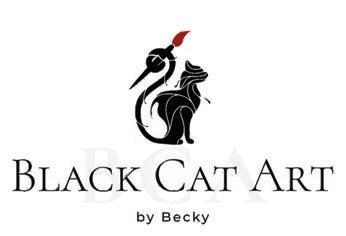

10% of her portrait proceeds to the Rivers Veterinary Urgent Care PAWS Fund to help pets with a life-threatening emergency receive the care they need as well as other Non-Profit organizations in the Pittsburgh area.
Becky’s pet portrait artwork is dependent on realistic and photographic like detail. She also strives to be able to capture the personality traits that need to be portrayed for the portraits to fully show the soul and personality of the pet or animal. By using the highest quality pastels and the ease of blending and texture she is able to capture fine details.
Besides pet portraits, Becky has started creating abstract and contemporary animal paintings in acrylics and murals for residents and business in and around Pittsburgh.

Black Cat Art LLC was founded by Becky Frazier who has been creating pet portraits, murals, and fine art paintings in Pittsburgh, PA and beyond. Whether you are looking to add a custom mural to your home or business, have a pet portrait commissioned, or just adding some art to a wall, Becky can help bring your vision to life.
Cat pet and of the Veterinary pets care like be able the the animal. the and and animal paintings Cat looking a a pet help your vision
FOR MORE INFORMATION VISIT HTTPS://RIVERSVET.COM/PAWS-DONATION-FUND

FOR MORE INFORMATION VISIT


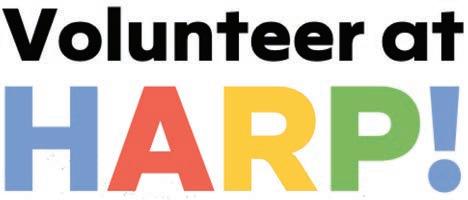
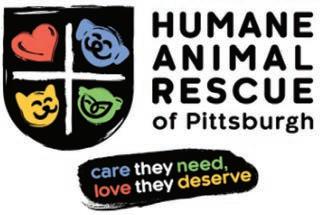



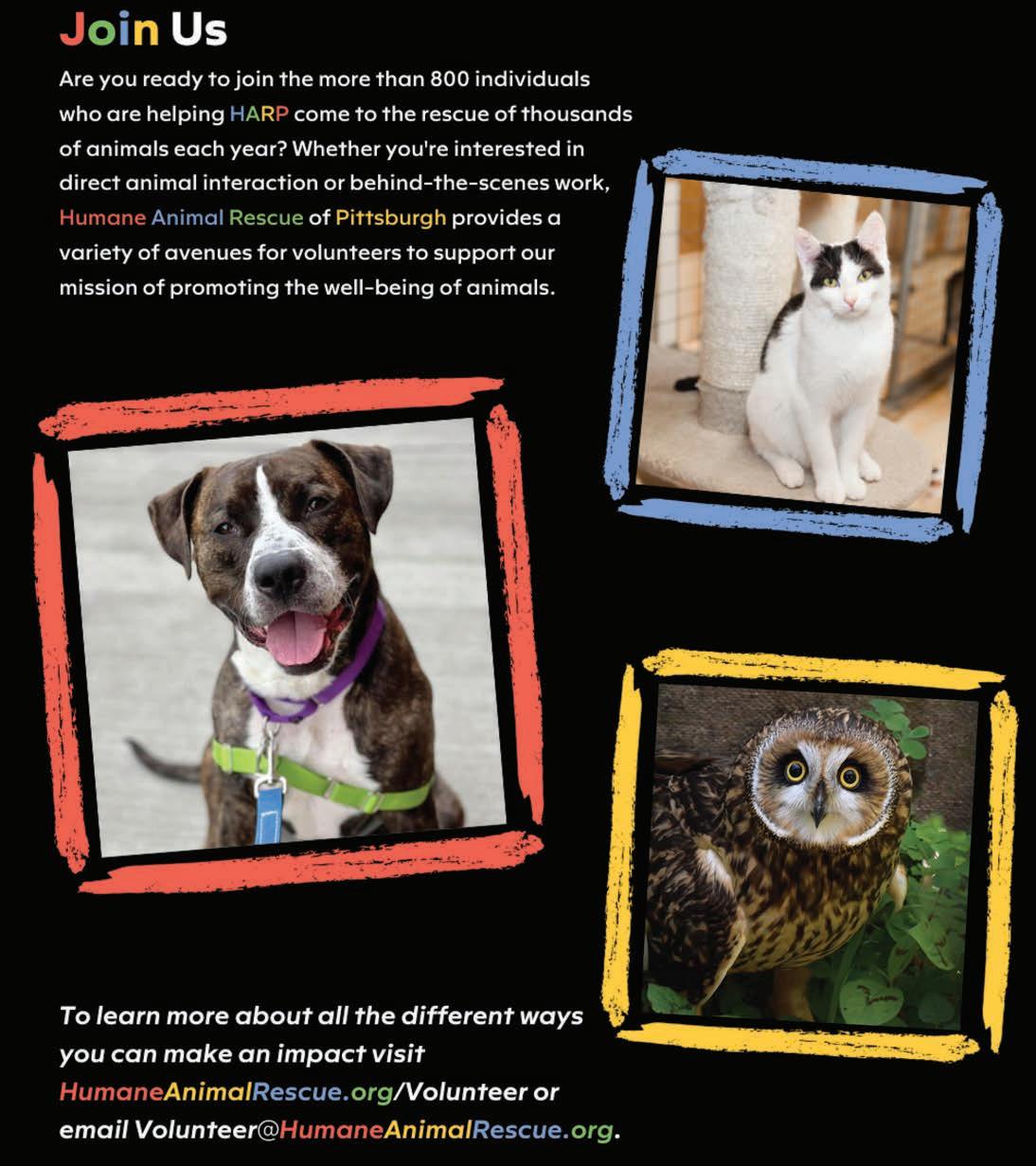





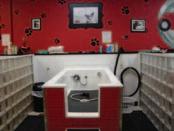
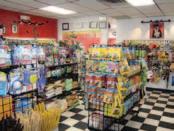
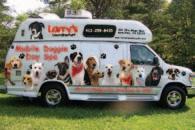
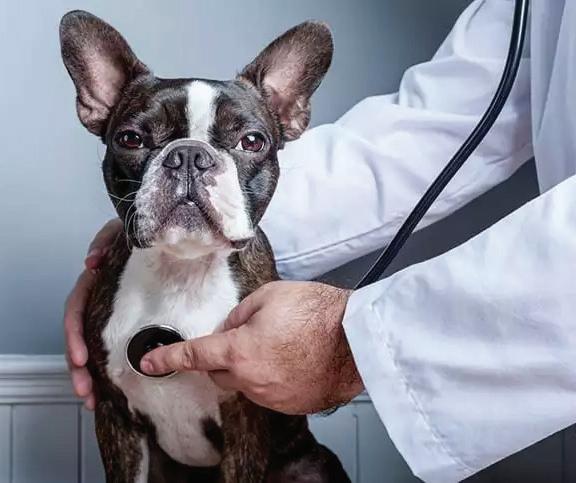



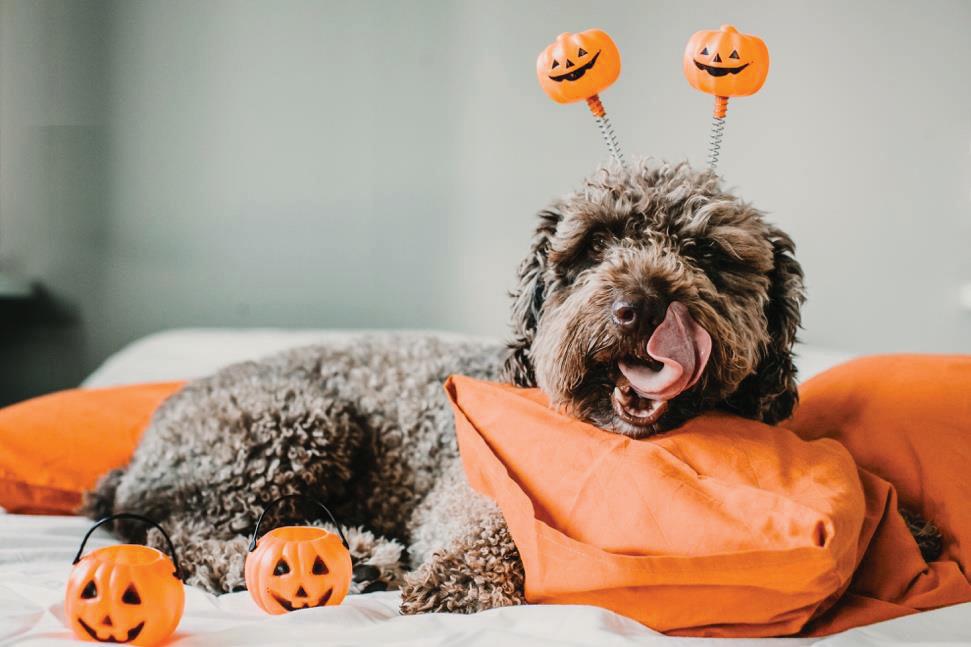 ByChristinaGenareo,DVM
ByChristinaGenareo,DVM
The holiday season brings with it many joys, but the veterinary emergency room often, unfortunately, sees an increase in toxicity related cases during most holidays, including during celebrations of Halloween. Severity of clinical signs following toxin ingestion can vary greatly depending on the type of toxin ingested and dose ingested. As is the case with any toxins, Benjamin Franklin’s assessment remains true: “An ounce of prevention is worth a pound of cure.” To minimize the need for a trip to the ER this fall, consider evaluating for the presence of and removing from your dog’s environment common Halloween associated toxins described below.
Chocolate is one of the most common toxins ingested by dogs. Depending on the type of chocolate ingested and the dose ingested by a dog, toxicity signs following toxin ingestion can vary from mild signs (vomiting, diarrhea) to more severe signs (tremors, seizures, heart arrhythmias). Chocolate raisins that may be ingested have the added kidney toxicity risk that comes from the ingestion of grapes and raisins.
Sugar free candies, including sugar free gum, can similarly result in severe signs of toxicity. Low blood sugar can develop quickly after ingestion of even small amounts of sugar free candy (ex: a 10 pound dog can develop signs of toxicity after
ingestion of even just one piece of gum!). Dogs can also experience liver associated toxicity following ingestion of sugar free products.
Though sugar free candies carry extreme risks to dogs if ingested, ingestion of large amounts of sugar and/or fat can also be dangerous to dogs. Ingestion of large amounts of sugar can result in water shifting within the body to result in a consequential increase in a dog’s blood sodium level. High sodium levels put dogs at risk for development of neurologic signs such as lack of responsiveness and seizures. Ingestion of high fat candies or holiday treats can increase the burden on the digestive system and increase the risk for development of pancreatitis, an often-painful inflammatory condition of the pancreas that can result in signs of GI upset and, in severe cases, can be life-threatening.
Other than ingestion of sweets themselves, dogs can also experience emergency conditions from the products that often accompany trick-or-treaters, as is the case when dogs ingest candy wrappers or glow sticks. Ingestion of candy wrappers can result in gastrointestinal foreign bodies/ obstructions/blockages with the potential need for surgical intervention. Glow stick ingestion can result in sudden onset of gagging, vomiting, and irritation to the eye and skin.
Considering the risk for toxicity if a dog encounters Halloween related toxins, keeping such toxins out of a dog’s reach (Ex: keeping the candy in a room or refrigerator outside a dog’s reach) is best. Some families also find training a dog to tolerate wearing a basket muzzle when not directly supervised as a secondary step to minimize toxin ingestion.
If, despite all best efforts, a toxin is ingested, seek emergency care, and contact one of the following animal toxicology hotlines to allow for treatment guidance:
• Pet Poison Helpline: 855-764-7661
• ASPCA Animal Poison Control Center: 888-426-4435.
SOURCES:
• Gupta RC. Veterinary Toxicology: Basic and Clinical Principles 3rd Ed. Academic Press 2018.
• Osweiler GD, Hoyda L, Brutlag A, Lee JA. Blackwell’s Five-Minute Veterinary Consult Clinical Companion: Small Animal Toxicology 1st Ed. Wiley-Blackwell 2010.
• https://www.petpoisonhelpline.com/pet-safety-tips/ is-xylitol-poisonous-to-dogs/#:~:text=Threat%20to%20 pets%3A&text=Chewing%20gums%20and%20breath%20 mints,eat%20one%20piece%20of%20gum!
• https://www.petpoisonhelpline.com/poison/glow-jewelry/ Imagesfrom:www.shutterstock.com

With increased demand and a national pet blood supply shortage, BluePearl Pet Blood Bank is dedicated to providing a safe and plentiful blood supply to animals in need. Please consider your pet becoming a hero to save another pet in need. The pets saved through our donor program may be your own.

Eligible dog blood donors are between ages 1-7, weigh 50 lbs or more, have a gentle temperament, are currently vaccinated, have never had a transfusion and are on heartworm, flea + tick meds. There is no cost to participate and donors receive free annual lab work.
Contact: pittbloodbank@bluepearlvet.com
Leo is a BluePearl pet hero.
Xenotaenia resolanae is a splitfin livebearer endemic to Mexico in the regions of Jalisco and Colima. Their habitats consist of murky streams filled with silt and mud with little vegetation. These fishes can be found at a dept of 3 feet or more with water temperatures between 73-78 degrees Fahrenheit. Because of the continued degradation of their environment, X. resolanae is listed as vulnerable by the International Union for the Conservation of Nature (IUCN).
These fish tend to be stocky and can reach a length of 3 inches. Males can be easily distinguished from females by the Andropodium (sexual organ that is notched at the seventh ray of the anal fin) and a larger dorsal. In some cases, females may be more vibrantly colored.

Unlike many species of splitfins that require a higher volume of vegetation in their diet, X. resolanae is considered a carnivore. I have been feeding my fish a variety of brine and krill flakes, baby brine shrimp, and freeze-dried daphnia and bloodworms. I also provide spirulina flakes a couple times weekly.
I first came across these fish last summer on Aquabid. At first glance upon receiving a pair, I knew they were unlike most of the splitfins I have been breeding in my fish room over the last four years. These fish were more robust and would require a larger aquarium. Therefore, they were acclimated to a 40-gallon aquarium consisting of a few live plants and small rock formations. Water parameters were maintained at 74 degrees Fahrenheit, pH of 7.8 and a DH of 30.
After giving them a week to settle into their new environment, I began conditioning the pair by feeding them a protein rich diet and doing a fifty percent water change weekly. Within
weeks, I noticed the male becoming more assertive with the female. At times, he became aggressive to the point where I had to remove her for a day or two because his interest was relentless. After a day or two of resting, I placed her back into the aquarium with the male. Soon after, I noticed the female’s stomach starting to round out. I moved her to a twenty-gallon aquarium that was densely planted where she could give birth without the male impeding. Within 50 days, the female gave birth to ten live fry that were ¼ of an inch long. The fry were active and taking live baby brine at first feeding. Although the mother did not seem to pay that much attention to the fry, I removed the fry to their own aquarium so that they could easily feed without competition from their mother for food.
The fry were fed four times daily with baby brine shrimp and crushed brine and spirulina flake. Fifty percent of the water in the rearing tank was changed twice weekly to maintain water quality due to heavy feeding. The young of this species tend to grow rather fast. And within 12 weeks, they were added to the 40-gallon aquarium with the parents. Presently, all fish are doing well and thriving. I am hoping for another drop of fry before the end of the year.
Reflecting over the last year of working with this species, I find their behavior similar in comparison to dwarf cichlids in temperament. They require amble room to swim and should be monitored for aggression. Providing ample space and crevices can lessen aggressive behavior with tank mates. Although X. resonlanae is an interesting fish to maintain in aquaria, I feel that they are not an appropriate species for the beginning hobbyist. However, to the aquarist willing to invest the time in maintaining this species; the outcome can be rewarding.
Echo was a tiny black kitten that was about to walk into traffic while I was traveling southbound on Route 28. I quickly pulled over and wondered how I was going to catch the little thing. Amazingly, she ran right to me and started purring. For months, Echo was a happy and healthy kitten, but one day I noticed that one of her pupils was smaller than the other. After sending out some blood tests, I made the devastating diagnosis of FIP. I did my best to give her good quality of life with steroids, eye medications, and acupuncture treatments, all the while knowing that the disease was fatal. Echo almost made it to her first birthday.
For over 20 years, a diagnosis of FIP meant death for cats, but in 2017 that changed. Dr. Niels Pedersen made it his life mission to find a cure for this disease, performing research in his lab for over 50 years, and reached his goal as a Professor Emeritus at UC Davis. We finally had something to help cats like Echo. Or did we? The story is a bit complicated.
Let’s start with the disease itself. FIP stands for Feline Infectious Peritonitis and is caused by a coronavirus that is specific to cats. As you know from the pandemic, coronaviruses are prone to mutate, and Feline coronavirus (FeCoV) is no different.
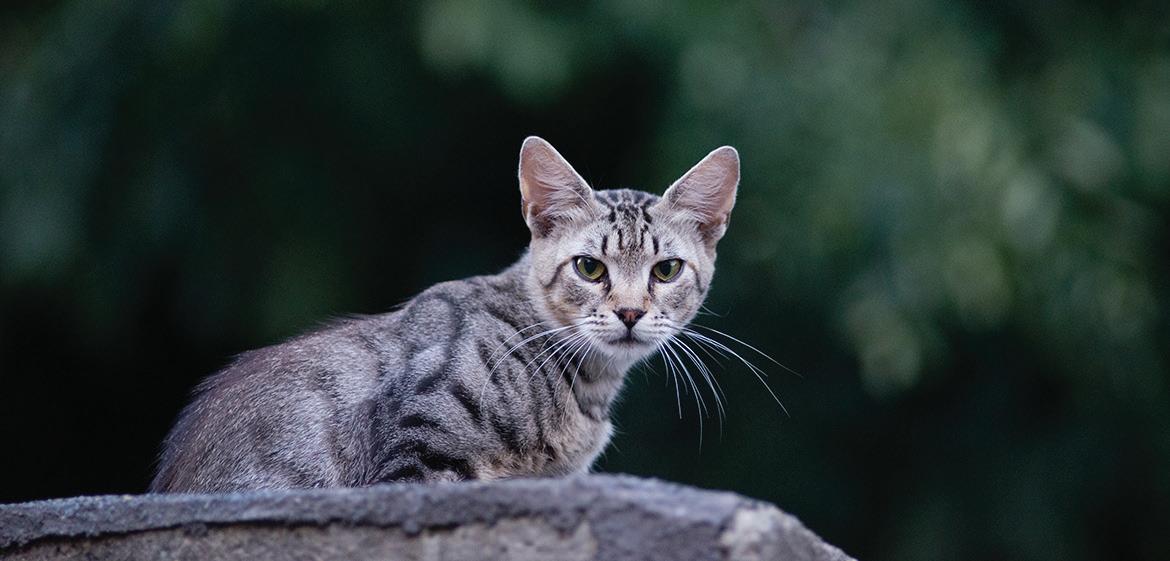
FeCoV is commonly transferred to cats via stool and may cause diarrhea or result in an asymptomatic infection. In a very small number of cats, FeCoV mutates in such a way that it becomes capable of causing FIP. This disease was initially discovered in cats with peritonitis, hence the name Feline Infectious Peritonitis. The “wet form,” as we call it, is the most easily diagnosed form – a kitten presents with a distended belly that keeps getting bigger. These kittens are also thin, with muscle loss over the back, and strawcolored and sticky fluid in the abdomen.
The other “dry forms” are much trickier to detect, but in almost every case these cats are under 2 years of age with significant weight loss. They may have inflammatory lesions
that cause back-end wobbling or other neurologic signs, masses called granulomas in the kidneys or at the junction of the small and large intestines, yellow colored skin and mucous membranes (jaundice), or eye inflammation like Echo. Cats with either the wet or dry form may also have a low-grade fever that comes and goes. Even though there are tests that are marketed as being “FIP specific,” the only tests that exist are those that detect all Feline coronaviruses, not just the version that mutates to cause FIP. This means that we are mostly diagnosing the condition based on the appearance of the cat and, perhaps, some basic bloodwork.
Once the diagnosis is made, what can we do? This is where things get complicated. Your vet may think that nothing can be done, as the treatment is not available by the normal channels. Unfortunately, the drug company that owns the patent has been sitting on this antiviral cure, preventing it from receiving FDA approval or being placed on the veterinary market for the past 5 years. Luckily, families with FIP kitties took matters into their own hands and crowdsourced the treatment by working with drug manufacturers outside of the U.S. and authenticating the medications through independent laboratories. Through FIP Warriors on Facebook, thousands of cats have now been cured.
While we have seen this miracle ourselves in five kittens that have come through Frankie’s Friends, I recently learned about a study where an animal shelter has data on 107 cats that completed the 12-week treatment and is collecting data from nearly a hundred more. Even with the inclusion of cats with other illnesses, Feline leukemia virus, and those already with advanced illness from FIP the shelter is getting a 91% cure rate.
While the internet and social media comes with its share of negativity, social networking was crucial to helping cats with FIP - gathering data, creating protocols, and helping cat owners get this lifesaving medication. Never underestimate the power of a cat loving community!
They are voiceless, defenseless, and homeless. They live on the streets in low-income neighborhoods, and in trailer parks, and a few lucky ones find a farm with a caretaker willing to care for them.
Their numbers are staggering. They are the homeless felines of Washington County. Most lack access to adequate food and shelter reproducing litter after litter. There are several contributing factors as to why cats find themselves homeless. One underlying cause is the lack of access to affordable veterinary care. Some individuals advocate for trap and kill as the solution to the homeless cat population.
However, internationally it is largely accepted that TNVR(trapneuter-vaccinate-return) is the most effective and humane method of addressing the homeless feline population. A significant component of TNVR is access to a high-volume low-cost spay/neuter clinic. High volume for the purpose of this article is defined as having the ability to perform 6,000 to 8,000 spays/neuters annually. Not until recently has a high-volume clinic even been a remote possibility within Washington County. The realization of that goal only recently became a real possibility creating a much-needed Oasis of Hope for Washington County felines because of the dedication of the founders of FIX’UR CAT.
Shortly after returning to the area Michelle Bruce became aware of the enormity of the homeless cat population in Washington County and the lack of resources needed to address the problem.
After learning that a few local TNVR groups had partnered with Animal Friends to bring their mobile unit to Washington County, Michelle, and Pat Spahr decided to form FIX’UR CAT and partner with Animal Friends to bring the mobile to additional areas of the county.
They quickly realized that a mobile once or twice a month
spaying/neutering 30-60 cats was only the tip of the iceberg. In addition to hosting the mobile, Michelle began transporting cats to Animal Friends on a monthly basis.
FIX ‘UR CAT applied for and was granted a 501c3 status in 2014. They continued to host mobile clinics and transport cats to Animal Friends for several years.
Eventually, the difficulties associated with meeting people in parking lots to pick up cats for transport convinced them that a brick-and-mortar building was needed. So in 2018, they purchased their current location in Canonsburg. Through the continued hard work and dedication of both its founders and volunteers FIX ‘UR CAT opened their own on-site surgical clinic in August of 2019. The clinic has since expanded to include wellness care. Progressing from 30-60 cats a month, FIX ‘UR CAT performed 3,656 lowcost feline spays-neuters in 2022.
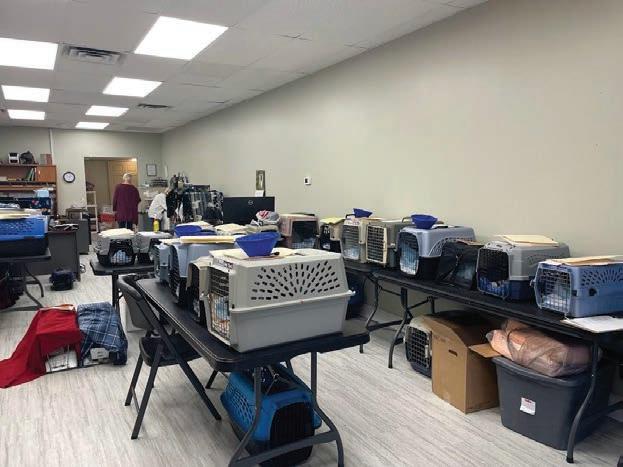
While their achievements and tireless dedication to Washington County felines should be acknowledged and applauded, their goals have not yet been reached. Michelle has continued her dedication to meeting the needs of the felines of Washington by purchasing a new location in the City of Washington. The newly acquired property, once renovated, will allow FIX’UR CAT to expand their operation’s capacity, and become a high-volume feline spay/neuter clinic.
The opening of the new facility will make the low-cost spayneuter component of TNVR a reality and allow for a humane solution for the homeless cat population while at the same time helping cats residing with low-income families to stay in their homes rather than being surrendered to a shelter or released to the streets.
This is all possible because of the hard work of dedicated individuals and the determination of FIX UR’ CAT’s founders and voluneers to help the defenseless, voiceless felines of Washington County, their cries have been heard and there is now an Oasis of Hope.
Instructor:
DVM, MS, CAWA
extensive training and Medicine, with a two graduate over a decade in Medicine/HQHVSN
Veterinarian.
HQHVSN (high spay/neuter)
University of Illinois Medicine and is Professor at the Florida College of and an Assistant at Penn State University. beckymorrow.dvm@frankies-friends.org
the Team!
Approved CE Credits Vet Techs!

This course will provide didactic and hands-on learning focused on High Quality High Volume Spay/Neuter (HQHVSN) techniques.
HQHVSN is based on optimizing the team, protocols, and workflow to provide safe and efficient spay/neuter of pets, shelter animals, and community cats. This is accomplished by creating simple protocols and procedures that maximize efficiency of the team while minimizing any potential f or oversights and developing skill through repetition.
12 RACE Approved CE Credits for Vets and Vet Techs!
Jan. 7-8
Mar. 4-5
Friends HQHVSN Training Center Kensington, PA Pittsburgh)
Learning!
6 HOURS - 2 DAYS
Learn time-tested and scientifically-validated techniques to:
Make smaller incisions for greater patient comfort and faster recoveries.
Maximize efficiency while obtaining excellent patient outcomes, allowing more surgeries in less time.
Enhance team morale and boost practice revenue by engaging the team to utilize their skills fully.
For more information or to register scan, call, or email!
Three-minute cat spays can easily and safely be performed based on slight modifications in surgical technique. HQHVSN is a way to save more lives - preventing homelessness and euthanasia due to overpopulation.

It is not just for shelters anymore!
In-clinic trainings available for larger teams within a 60 mile radius.
Nearly 1 million cats lose their lives each year due to overpopulation and lack of homes. A large part of the problem is the community cat population, the 40 million cats in the United States that are homeless and breeding. This “unowned” cat population is responsible for around 80% of the kittens born and brought into shelters, leading open door shelters to do what is unthinkable to us - euthanize cats that haven’t been adopted to make space for those suffering in the streets.
This is where we come in. Our mission is to end suffering and overpopulation by “turning off the faucet” rather than “bailing out the tub.” It means becoming proactive and getting these community cats spayed, neutered, and vaccinated so we don’t have to continue this cycle of reactivity and unnecessary killing. There is no need to "recreate the wheel," we have spayed and neutered tens of thousands of cats and as the commercial says, "learned a thing or two." We hope to have the opportunity to share what we've learned with you.
Learn time-tested scientifically-validated techniques
Make smaller patient comfort recoveries.
Maximize efficiency excellent patient more surgeries
Enhance team practice revenue team to utilize
724-889-7011
clinic@frankiesfriends.org
Session 1 - Jan. 7-8
Session November 18-19
Session 2 - Mar. 4-5
Held at Frankie's Friends HQHVSN Clinic and Training Center In New Kensington, PA (17 miles from Pittsburgh)
Meet Your Instructor: Becky L. Morrow, DVM, MS, CAWA
Dr. Morrow has extensive training and experience in Shelter Medicine, with a master’s degree, two graduate certificates, and over a decade in practice as a Shelter Medicine/HQHVSN Veterinarian.
Dr. Morrow taught HQHVSN (high quality high volume spay/neuter) techniques at the University of Illinois College of Veterinary Medicine and is currently an Adjunct Professor at the University of Florida College of Veterinary Medicine and an Assistant Teaching Professor at Penn State University.


For more information register scan,

724-889-7011 clinic@frankiesfriends.org
beckymorrow.dvm@frankies-friends.org
Toilet water? We “go” there, don’t they know that? So why do cats drink out of toilet bowls when they’ve got a water bowl, and maybe even more than one?
But their water bowl may be filled, or half-filled, or so...with water that you put in there days ago. It still looks fine to us, but it may be stale, room temperature water, and may have a light coating of cat hairs that float around in the air and land on the surface. And the bowl itself may have collected minerals from the water coating the bottom and sides, and perhaps even some slimy stuff in there that you really can’t see.
Whereas the toilet—each time we flush the toilet, likely several times a day, it’s refilled with fresh and usually cool water.1
Biological instincts guide cats still from the time when they lived without convenient water bowls. In nature water can be difficult to find so cats will often take a sip of any water source they find as long as it seems fresh and clean, like puddles. Also in nature they share those water sources with other species and finding a water source free of other animals is rare so they take advantage of it.
Looking at the toilet as a cat, then, they are after an essential element in their life and the toilet bowl holds a gallon or so of it ready to go and free of interspecies dangers. Plus, it’s fun! Lots of cats like a challenge for those dull old daily activities.
Toilets are washed with various sanitizing chemicals, nearly all of which are toxic to cats, even residue, even fumes. Paws inside the toilet could touch that reside, and the toilet water could hold residue as well. Also, if a device of some sort emits sanitizing chemicals with every flush you don’t ever want your cat to come near that. 2 Plus, we probably don’t clean our toilets every day and nasty things can build up in there.
And the same as letting them drink from a sink faucet, if it becomes their preferred water source it may not be available when they need it, and cats need fresh water available to them at all times.
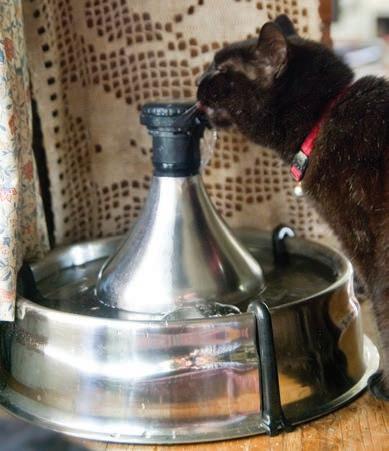
Like all other behaviors that we deem “bad” we need to understand why cats are doing what they’re doing and find an acceptable substitute for it.
So cats need to drink water each day, they will drink water opportunistically, they want the freshest water available so they know it’s safe, and they like to have a little fun while they do. That
sounds like cats need multiple water sources including fountains to fulfill all the requirements on their list.
If cats seem to avoid water sources we provide it’s usually not because they don’t like to drink water. It’s true that a wet food only diet may fulfill the basic water intake requirement for a cat, but all cats have different requirements determined by total dietary intake, age, health condition and more variables. For instance, dry food in the diet will increase their need for supplemental water, older cats don’t process fluids as efficiently as younger cats, and we all need a higher fluid intake during hot weather. With a cat’s ancestral desert beginnings to concentrate urine, they can never have too much water.
So if they’re not drinking water it’s usually because the water source we’ve provided is poorly placed or we’re not keeping it as clean as their instincts say they need.
You should provide more than one water source so they can get their water in various places, as they would in nature. Those sources can be fountains and/or bowls of still water, one placed in each room or area where they spend time. A fountain keeps the water fresh and aerated and cats are attracted to both the sight and sound of moving water. Bowls only need to hold a cup or two.
Place water out of direct sun and away from traveling paths around the house both to keep the water clean of household dust and fur that might be raised with a human or cat passing by, and for the drinker to be undisturbed while drinking. Like food bowls, try to place it so the cat isn’t facing a wall to drink, but can see the room.
You can choose from a huge variety of fountains and follow instructions for cleaning and filter changes. Water in bowls should be changed daily, and the bowl washed. I use the “cat water” to water plants and have a stack of glass, ceramic and stainless steel bowls in the bathroom, kitchen and basement so that I can easily wash and always have clean bowls on hand. The smell of tap water can turn cats away so try filtered water.
If the level in a particular bowl or fountain seems to reduce quickly, check to see who uses it and if anyone seems to be drinking more water than usual. It may be that source is just really convenient for the feline household, or it could indicate a health issue.
RESOURCES:
1 Cat Behavior Associates, “Why Does My Cat Drink From The Toilet?”: https://catbehaviorassociates.com/why-does-my-catdrink-from-the-toilet/
2AVMA Article, “Household Hazards”: https://www.avma.org/ resources/pet-owners/petcare/household-hazards
Our clinic is located at 207 Allegheny Street, Tarentum, PA 15084. All appointments include surgery, pain medicine, rabies vaccine and flea treatment.
CLINIC REGISTRATION
BY PHONE: call 412-321-4060 and leave a message. Please include your name and phone number in your message. Someone will return your call and complete your pre-registration. HCMT is all volunteer and this may take some time. Clinics fill up quickly and it’s best to call at least two weeks in advance of the clinic you want to attend.
BY EMAIL: Email cathomeless@gmail.com with your name, number of spots you need and which date you are registering for. You will receive a confirmation email ONLY if you are registered. NOTE: dates may be added and are subject to change.
2023 CLINIC DATES FREE CLINICS (ferals only)
FAST TRACK CLINICS Ferals: $30 Pet/friendly cats: Females $55, Males $40
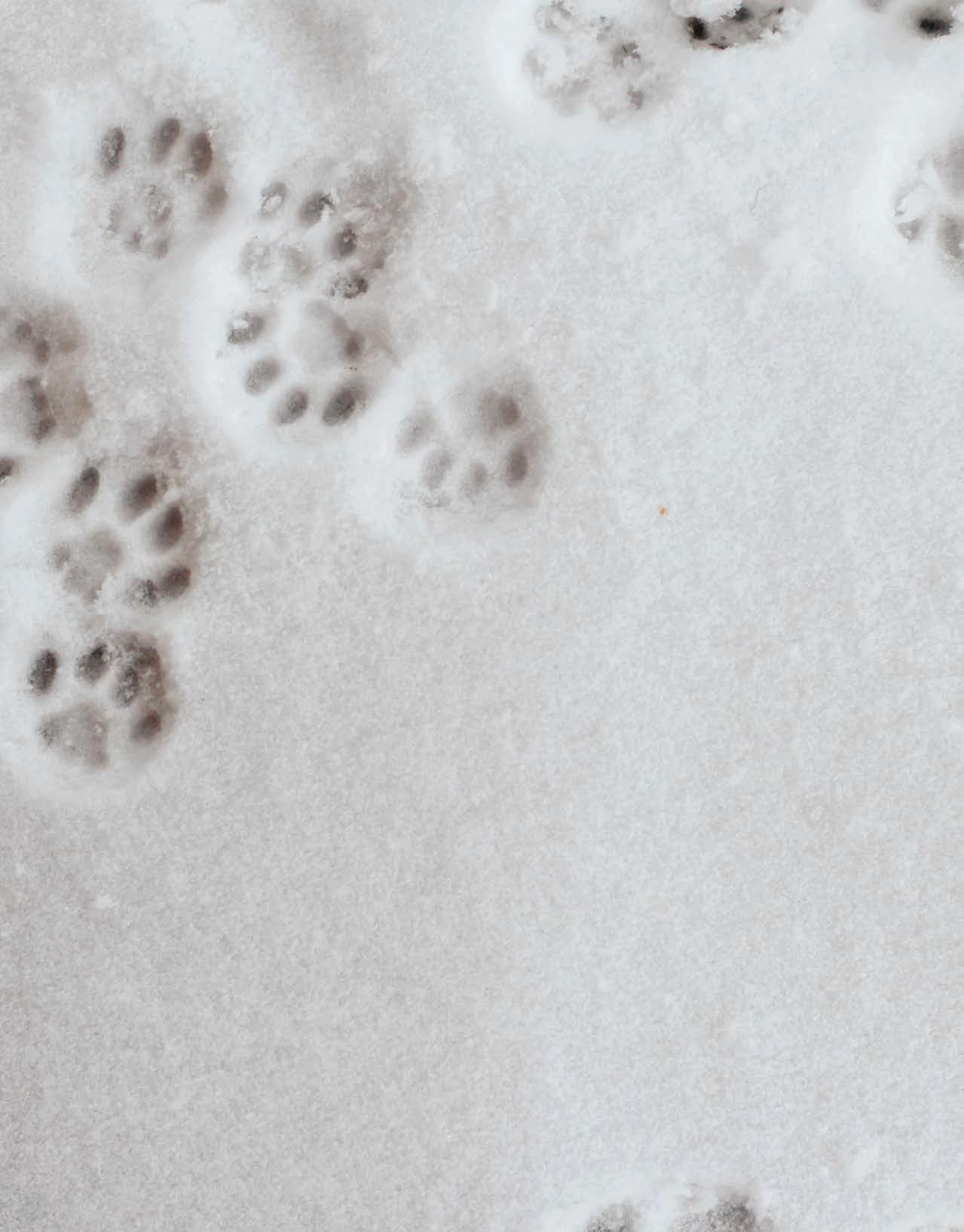
September 16 - Alley Cat Rescue, Inc.
October 14 - Pam and Don Shirey
September 2 September 30
October 28 November 25
November 11 - In loving memory of Marita Hout
December 9 - Alley Cat Rescue, Inc.
December 23
NOTE:datesaresetfortheclinics,butatpublicationit’snotyetdeterminedwhichclinicsareFreeorFastTrack. Checkwww.homelesscat.org/clinic-infoforthemostuptodateinformation.
More dates may be announced and dates are subject to change. Check www.homelesscat.org/clinic-info for the most up to date information.
This is an ever-changing list of resources for pet owners in Pittsburgh and beyond including low-cost spay and neuter programs for pets as well as TNR for community cats, after-hours emergency care, help with veterinary bills, pet-friendly rentals in Pittsburgh and across the US and links to shelters for adoption and other services. This information is provided for reference only and subject to change without notice. Please contact the organization or agency before using their services.
Low-cost Spay and Neuter Organizations and Programs
TNR AND LOW-COST SPAY/NEUTER PITTSBURGH AREA
Homeless Cat Management Team
207 Allegheny St., PO Box 100203, Tarentum, PA 15084, 412-321-4060 http://www.homelesscat.org/
FeralCatsandRescuedCats.Feralcatsmustarriveinahumanetrap.Check thewebsiteforclinicdates.Allappointmentsmustbemadebycallingthe phonenumber.Nowalk-ins.Ferals:$30.00FastTrack,no-chargeatfreeclinics. RescuedCats:Females$55.00,Males$40.00Bothincluderabies,earmiteandflea treatments.Otherservicesavailable.
City of Pittsburgh Free Spay and Neuter for City Residents CityofPittsburghoffersfivefreespays/neuterstoallcityresidents http://www.pittsburghpa.gov/publicsafety/animal-control/spay-neuter.html
Low-Cost Spay/Neuter Programs at Shelters in Allegheny and surrounding counties
SHELTER PROGRAMS
Animal Friends https://www.thinkingoutsidethecage.org/pet-care/spay-neuter/ Pet/friendlycats:$65spayorneuter,includespainmedication–vaccinesrequire areanadditionalfee.
Feral/OutdoorPackage:$50,includespainmedication,rabies,FVRCP,eartipand fleatreatment.Catsmustbeferalandinahumanetraptoreceivethisservice.
Humane Animal Rescue https://humaneanimalrescue.org/veterinary-care/spay-and-neuter-services/ EastEnd:66209HamiltonAve.,Pittsburgh,PA15206,412-661-6452 NorthShore:1101WesternAve.,PittsburghPA15233,412-321-4625
Pet/friendlycats:$70spay/neuter,rabies,FVRCP(distemper),microchip
Feral/OutdoorPackage:$50,includespainmedication,rabies,FVRCP,eartipand fleatreatment.Catsmustbeferalandinahumanetraptoreceivethisservice.
Beaver County Humane Society
3394 Brodhead Road, Center Township, PA 15001, 724-775-5801 https://beavercountyhumanesociety.org/tnr-and-owned-cat-surgery-prices Friendlycats:beginat$75.Feralcats:beginat$35 Visitwebsiteformoreinformation.
Clarion Paws (Serves Clarion, Forest and Jefferson County)
Mailingaddress:P.O.Box804,Clarion,PA16214
CurrentLocation:11348Route322,Shippenville,PA
(ClarionRiverHill,betweenKronospanandClarionElectric) http://www.clarionpaws.org/programs/spay-neuter/ Monthlyclinicslistedonwebsite,submitanapplication.
Petsorferals:$65spay,$45neuter.Includesrabiesvaccine,earmitecheckand treatmentandfleatreatment. Optionalservicesatanupcharge.Trappingand financialassistancethroughSpayNeuterprogrammaybeavailabletoClarion, ForestandJeffersonCountyferal/straycatcaregiversonacasebycasebasis.
Butler County Humane Society
1015EvansCityRoad,Renfrew,PA16053
https://butlercountyhs.org/clinic/
Forcurrentpricingandscheduleinformationpleasegiveusacallat724-789-1150.
Washington Area Humane Society
1527Route136,EightyFour,PA15330
http://washingtonpashelter.org/ Currentlymovingintonewbuilding.
Low-cost Spay/Neuter Organizations in Allegheny and surrounding counties (alphabetical)
Theseareorganizationswhicharenotday-to-dayclinicsbutorganize,host, sponsororotherwiseprovideaccesstospayandneuterservices.
Catnip Acres (Greene County)
155DarkHollowRd,Waynesburg,PA15370
https://catnip-acres.com/
TheCatnipAcresclinicwasdestroyedinafire(noanimalswereharmed!)inJanuary2022 buttheyarerebuilding.Clinicsareonholduntiltheyhaveaspacefortheclinicagain.
Fix ‘Ur Cat Spay & Neuter Clinic
LowCostSpayNeuterWashingtonCounty,Inc.,DBAFix‘UrCat 18WestPikeStreet,Canonsburg,PA1531
Call724-405-7FIX(7349)foranappointment.Spay/neuterclinicsareby appointmentonly.Pets:$60forfemales,$50formalesFerals:$50 Downloadandcompleteapplication,mailinforappointment. https://www.fixurcat.org/spay-and-neuter/
Fluffy Jean Fund (Washington County) Packagesat$65and$85
CallFaithforAvailableDatesandAppointments (724)941-5683press1
E-Mail:faith.b2@verizon.net
http://fluffyjeanfund.weebly.com/
Frankie’s Friends
7305thAvenue,NewKensington,PA15068,724-889-7011
Spay/neuterforpet/feralcats:Neuter$50,Spay$65,includesrabies,ear mitetreatment,fleatreatment.Alsoofferslowcostvaccinationsandbasic medicaltreatments.
Byappointmentonly,nowalk-ins.Usewebsiteorcalltoschedule. http://www.frankies-friends.org/
Fund for Feral Cats of Pittsburgh Reimbursespartialfundstohelpspay/neuterferalcats (fundsnotalwaysavailable)
PoBox55135,Pittsburgh,PA15207-0135
Lawrence County Animal Relief Fund (LCARF) POBox8514,NewCastle,PA16107,724-510-4952
http://www.lcarf.com/
Monthlyclinics:$70Spay/NeuterforCatsandKittens!Includesa rabiesvaccine,FVRCPvaccine,(distemper)andfleaandearmitetreatment Operation Spay/Neuter Butler,PA(forButlerCountyresidentsonly)
Income-basedspaysandneutersfordogsandcats.Call724-287-SPAY(7729)or youcanemailfordetails
http://operationspayneuter.com/
Pet Search
P.O.Box1653,Washington,PA15301 Call724-228-7335forclinicinformation. http://www.petsearchpa.org/
SNIPP: Spay and Neuter Indiana PA Pets Westmoreland/IndianaCounties,Alle-KiskiValley (Leechburg)Monthlylowcostclinics,checkwebsitefordates andavailability.
http://www.snippindianapa.org/
Low-cost Spay/Neuter and Veterinary Clinics Fix’N Wag’N Spay/neuter:$70.Visitthewebsiteforupcomingdatesandplaces. https://fixnwagn.com/
THESE ARE INDEPENDENT CLINICS THAT OFFER SERVICES ON SITE DURING REGULAR BUSINESS HOURS.
Frankie’s Friends 7305thAvenue,NewKensington,PA15068,724-889-7011 Spay/neuterforpet/feralcats:Neuter$40,Spay$55,includesRabies,Earmite treatment,FleaTreatment.Alsoofferslowcostvaccinationsandbasicmedical treatments.
http://www.frankies-friends.org/
Penn Hills Spay/Neuter Clinic
11644FrankstownRd,Pittsburgh,PA15235,412-244-1202
OpenMonday-Friday.Nolongerofferingwalk-inservicesforferals. Pet/TNR:Spay$56,Neuter$37,visitwebsitefordetailsandscheduling. Alsoofferslowcostvaccinationsandbasicmedicaltreatments. http://www.spayaz.com/Pittsburgh.html
North Hills Spay/Neuter Clinic
3967WilliamFlinnHwy,AllisonPark,PA15101,412-213-7353
OpenMonday-Friday.Nolongerofferingwalk-inservicesforferals. Pet/TNR:Spay$56,Neuter$37,visitwebsitefordetailsandscheduling. Alsoofferslowcostvaccinationsandbasicmedicaltreatments. https://spayaz.com/locations/pittsburgh-north-hills/
Find Local Low-cost Spay, Neuter and Veterinary Care on the Internet
Low-cost Neuter and Spay (search by zip) http://neuterspay.org/
Love That Cat (online search)
http://www.lovethatcat.com/spayneuter.html
Spay USA
http://www.spayusa.org/search.php
Spay and Neuter Early, a Humane Alliance Campaign http://www.whentospay.org/get-your-pet-fixed
Get Your Fix.org
http://getyourfix.org/
ASPCA searchable map of low-cost clinics in US & Canada https://www.aspca.org/pet-care/general-pet-care/ low-cost-spayneuter-programs
EMERGENCY AND AFTER-HOURS CARE
Pittsburgh Veterinary Specialty and Emergency Center (PVSEC) http://www.pvs-ec.com/
Rivers Veterinary Urgent Care Walk-in,urgent,emergencycareaswellassurgeriesandregularwellness appointmentsduringdaytimehours.
560McNeillyRd.,PittsburghPA15226,Phone:412-998-9030,Fax:412-998-9034 https://riversvet.com/
VCA Castle Shannon Animal Hospital http://www.vcahospitals.com/castle-shannon
VCA Northview Animal Hospital Specialty Referral Center http://www.vcahospitals.com/northview
A-VETS, http://www.avets.us/ PET-FRIENDLY RENTALS
InthePittsburgharea,visitthislistonthe
FosterCatwebsite: http://www.fostercat.org/friendly.html
Nationwide (United States only) http://www.rent.com/pet-friendly-apartments
SHELTERS AND SHELTER SERVICES
Adoption,surrender,low-costclinics,petfood pantries,referrals,etc.
Humane Animal Rescue, North Shore (Western PA Humane Society) www.wpahumane.org
Humane Animal Rescue, East Liberty (Animal Rescue League) www.animalrescue.org
Animal Friends (AFI), www.thinkingoutsidethecage.org
Animal Advocates, animaladvocates.net
Washington Area Humane Society, www.washingtonpashelter.org
Butler County Humane Society, www.butlercountyhs.org
Beaver County Humane Society, www.beavercountyhumanesociety.org
ANIMAL CRUELTY LAWS BY STATE (UNITED STATES)
Animal Legal & Historical Center www.animallaw.info/articles/armpstatecruelty.htm
ANIMAL EDUCATIONAL EXHIBITS
North:
Greater Pittsburgh Aquarium Society www.gpasi.org
The Pittsburgh Zoo & PPG Aquarium pittsburghzoo.org
The National Aviary nationalaviary.org
ANIMAL-RELATED ART, PHOTOGRAPHY & RETAIL
April Minech Custom Portraits | Pet Inspired Art www.ladybugdelightz.etsy.com
North:
Kim Lenz, Behind the Lenz Photography 412-983-0981, https://www.facebook.com/ Behind-the-Lenz-127787624032093/
Buzzy Photography
412-371-5212 | anita@buzzyphoto.com
South:
Kara Jones Photography, kjones.smugmug.com
Paws ‘n Claws Eyewear, PawsnClawsEyewear.com
ANIMAL RESCUE ORGANIZATIONS
North:
Animal Friends
412-847-7000 | thinkingoutsidethecage.org
Beaver County Humane Society
724-775-5801 | www.beavercountyhumanesociety.org
Frankie’s Friend Rescue 724-889-7011 | www.frankies-friends.org
Pennsylvania Great Dane Rescue, 724-869-9185
Hope Haven Farm Sanctuary
412-366-1187 | hopehavenfarm.org
South:
Animal Care & Welfare
412-244-1372 | animalcareandwelfare.org
Droopy’s Basset Rescue
888-9 GET DROOL | www.droopysbassetrescue.com
Washington Area Humane Society 724-222-7387 | washingtonpashelter.org
Animals Against the Odds Rescue/Rehab www.aato.rescueme.org
South Hills Pet Rescue 724-622-0434 | www.southhillspetrescue.org
East:
Humane Animal Rescue
412-345-7300 | animalrescue.org
HAR Wildlife Center 412-345-7300 | animalrescue.org
SW PA Pugs with Special Needs 724-763-2790 | swpapug.org
West:
CARMAA, 412-780-4983 | carmaa-petadoption.com
Greater Pittsburgh Area: SPAAR, www.seniorpetandanimalrescue.org
Guardian Angels Pug Rescue, 724-537-3466 www.facebook.com/guardianangelspugrescue
Humane Society of Greene County 724-627-9988 | greenepet.org
PEARL Parrot Rescue, www.pearlparrots.com
AQUARIUM SOCIETIES
Greater Pittsburgh Area:
Greater Pittsburgh Aquarium Society www.gpasi.org
BIRD & SUPPLIES
Natural Inspirations Parrot Cages www.naturalinspirationsparrotcages.com
DOG TRAINING
North:
AKIN Family Dog Training (Lilian Akin) 412-732-8091 | akinfdt.net
Greater Pittsburgh Area:
Happy Pets Training/Christine Flint 412-373-9583 | www.happypetstraining.com
Success Just Clicks, successjustclicks.com
DOG TRAINING CLUBS
South:
Dogworks Training Center at The Canine Club 412-220-8100 | www.thecanineclub.com
Golden Triangle Obedience Training Club 412-653-6880 | gtotc.com
Keystone Canine Training
412-833-2211 | keystonecanine.com
Xcel Canine Training Center
412-833-2504 | xcelcaninetraining.com
EQUINE BOARDING, LESSONS & TRAINING FACILITIES
North:
Rockin’ Horse Stables
724-601-4706 | rockinhorsestables.com
South:
Coventry Equestrian Center, 724-206-9902
Manon’s Farm, 724-705-7912 | 724-621-0260
SydMor Equestrian Center
724-969-0510 | www.sydmorstables.com
EQUINE FEED & SUPPLY
AGWAY - SOUTHERN STATES
North:
Mount Nebo Agway, Sewickley, PA | 412-364-4430
Beaver Agway, Beaver, PA | 724-775-0535
Mars Agway, Mars PA | 724-625-2340
South:
Eighty Four Agway, Eighty Four, PA | 724-222-0600
East:
Ligonier Agway, Ligonier, PA | 724-238-6207
West:
Imperial Agway, Imperial, PA | 724-695-7388
EQUINE TACK STORES
North:
Shady Acres Saddlery
412-963-9454 | www.shadyacressaddlery.biz
South:
Lowry’s Western Store 724-228-1225 | lowryswesternshop.com
EQUINE VETERINARIANS
Dr. Brian Burks, DVM - Fox Run Equine Center 724-727-3481 | foxrunequine.com
HOLISTIC PET PRACTITIONERS
Pet Chiropractor
North:
Dr. Doug Knueven, DVM, Beaver Animal Clinic
724-774-8047 | beaveranimalclinic.com
Greater Pittsburgh:
Dr. Michael Savko, DC, CCSP, CVCP 724-261-7915 | drchirovet.com
EASE Animal Massage
412-447-8490 | www.easeanimalmassage.com
Wholestic Equine & Pet Services
205-492-1000
HOLISTIC PRACTITIONERS FOR GUARDIANS
East End:
Judith Levy, Coaching/Energy Modalities
412-726-2659 | www.judithlevycoaching.com
South:
HOLISTIC VETERINARIANS
Dr. Doug Knueven, DVM, Beaver Animal Clinic 724-774-8047 | beaveranimalclinic.com
Dr. Qiang Li VCA Castle Shannon
412-885-2500
PET BURIAL, MEMORIAL & CREMATION SERVICES
South:
Chartiers Custom Pet Cremation
412-220-7800 | ccpc.ws
Jefferson Memorial Funeral Home 412-655-4500 | jeffersonmemorial.biz
Greater Pittsburgh: Thousand Hills Pet Crematory
724-355-8296 | www.thousandhillspetcrematory.com
Sunny Acres 412-292-6701 | sunnyacres.6@gmail.com
PET GROOMING
North:
All About Dogs
724-925-1577 | allaboutdogsgrooming.info
South:
Aunt Kimmy’s Paw-Lor
724-299-3457
Happy Tailz Pet Spa
412-759-7620 | Happytailzpetspa.com
Larry’s Laundromutt
412-534-4052 | Larryslaundromutt.com
East:
Animal Elegance 412-361-1177 | www.animal-elegance.com
Cat Around Town Cat Grooming 412-466-7877 (PURR) | cataroundtown.com
Greater Pittsburgh Area: Zoom N Groom (Sonya Patterson), 724-225-4827
Bactronix, 412-375-7886 | www.bactronix.com
Good Nature Organic Lawn Care
888-LAWNSAFER | whygoodnature.com
Giant Eagle Waterfront
420 E Waterfront Dr, Homestead, PA 15120 412-464-6600
J & D Waterproofing
www.jdwaterproofing.com
Simple Sugars Scrub, Simplesugarsscrub.com
Village Shoppes Scenery Hill
Elves Lair Christmas & Gifts, Jan’s Tea Shoppe - 2nd Street Coffee Roasters, Velvet Envelope, Westerwald Pottery, Two Old Crows, www.sceneryhillpa.com
Wags and Wine
www.wagsandwine.com
Greater Pittsburgh Area:
Fragasso Financial Advisors 412-227-3200 | www.fragassoadvisors.com
J & D Waterproofing Home Improvement
724-746-8870 | www.jdwaterproofing.com
Matt Arch Foundation, www.connectarian.com
One Hour Heating & Air Conditioning 724-225-1644 | www.onehourair.com
OxyMagic, 412-781-4110 | www.oxypgh.com
Redford Photography
www.redfordphotography.com
Susan G. Komen Pittsburgh 412-342-0500 | www.komenpittsburgh.org
East
Pittsburgh East Nissan 412-824-9020 | www.pittsburgheastnissan.com
Unique Home Solutions www.uniquehomesolutions.com
South: Southpointe Chamber, www.southpointe.net
PET-FRIENDLY LIVING
Greater Pittsburgh Area:
Judy Smith Team Realtor – Berkshire Hathaway 412-274- 7618 | www.thepreferredrealty.com/real-estate-agent/2242288/judy-smith-team/details/
Pinch Property Services
412-445-8550 | PinchPropertyServices.com
East:
The Getaway at Glen Highland Farm www.glenhighlandgetaway.com
South:
American Destiny Real Estate Services
412-983-2220 | www.adr-usa.com
Amore
877-716-6840 | amoreapartments.com
PET GROOMING SCHOOLS
North:
Pa Academy of Pet Grooming, 412-759-7620
PET REHABILITATION
Rebound Pet Rehabilitation
4152-508-2285 www.reboundpetrehabilitation.com
PET MINISTRIES
South:
Christ United Methodist Church
412-277-1096 | christumc.net
Westminster Presbyterian Church
412-835-6630 | westminster-church.org
PET RESORTS - BOARDING, DAYCARE, GROOMING & TRAINING
Camp Bow Wow, www.CampBowWow.com
Locations:
Camp Bow Wow Pittsburgh Southwest
710 Trumbull Dr., Pittsburgh, PA 15205
412-276-WAGS (9247)
Camp Bow Wow Pittsburgh North
2327 Babcock Blvd, Pittsburgh, PA 15237
412-931-WAGS (9247)
Camp Bow Wow Highland Park
1325 Washington Blvd, Pittsburgh, PA 15206
412-362-PLAY (7529)
Camp Bow Wow Pittsburgh East
1610 McClure Rd, Pittsburgh, PA 15146
724-733-CAMP (2267)
North:
Dog stop - North
724-935-DOGS (3647) | www.thedogstop.net
The Dog Stop - Sewickley
412-766-DOGS (3647) | www.thedogstop.net
Lucky Paws Pet Resort
724-728-1484 | www.luckypawsresort.com
South:
Fuzzy Paws Pet Villa
724-746-3899 | fuzzy-paws.com
Hounds Town USA
412-232-5285
www..houndtownusa.com
The Dog Stop - Banksville Rd.
412-343-1171 | www.thedogstop.net
Pampered Paw Resort
724-413-3135 | pamperedpawresort.com
East:
Pittsburgh Pet Concierge
412-856-8505 | petconcierge.org
Doggone Awesome Pet Services, 724-212-0427 www.doggoneawesomepetservices.com
The Dog Stop - Monroeville
412-373-3355 | www.thedogstop.net
The Dog Stop - East End
412-361-0911 | www.thedogstop.net
The Dog Stop - East: Strip District
412-315-7050 | www.thedogstop.net
Country Lane Pet Hotel
412-824-7991 | www.countrylanepethotel.com
Walkers Pet HoTail
724-327-7297 | www.WalkersPetHoTail.com
PET RETAIL/SUPPLY
East:
Petagogy, petagogy.com | 412-362-7387
Petland East Side Village
412-363-PETS | www.petlandvillageofeastside.com
Greater Pittsburgh Area:
Asgard Raw Dog and Cat Food
412-408-3355 | www.asgard-raw.com
Baskets of Nature
724-831-9437 | www.basketsofnature.com
Dig It Collars, dig-it-store.com
Trixie’s Dog Fashions
www.trixiesdogfashions.com
O2 Derm Pet Topical Gel, www.O2Dermpet.com
PET SITTERS
North
Furry Family Pet Sitting
412-999-9524 | www.furryfamilypetsitting.com
Western PA No Boarders Pet and Animal Care
Home & Farm Sitting
724-219-7801 | Noboarders-petcare.com
South:
Your Critter Sitters (Raylene Hoover)
724-448-7330 | yourcrittersitters.com
East:
Pittsburgh Pet Concierge
412-856-8505 | petconcierge.org
VETERINARY HOSPICE & MOBILE SERVICES
Greater Pittsburgh Area:
Nancy A. Ruffing, DVM
412-801-1071 | gentlejourneyvet.com
VETERINARY PHARMACIES
Greater Pittsburgh Area: Murray Avenue Apothecary
412-421-4996 | MAApgh.com
VETERINARY HOSPITALS
North:
Beaver Animal Clinic
724-774-8047 | beaveranimalclinic.com
Frankie Friends Veterinary Services
724-889-7011 | www.frankies-friends.org/low-costveterinary-services 724-889-7011
VCA Northview Animal Hospital
412-364-5353 | vcanorthview.com
South: All About Pets Veterinary Hospital
724-745-5503 | aapvet.com
All About Pets Veterinary Hospital – Washington location
724-503-4887 | www.aapvet.com
All Life Veterinary Clinics, 724-281-3446
Cheyenne Veterinary Wellness & Surgical Center
412-884-3162 | www.cheyennevet1.com
East:
The Big Easy Animal Hospital
412-908-9301 | tbeah.com
Monroeville Pet Hospital
412-372-1100 | www.monroevillepethospital.com
VETERINARY SPECIALTY & EMERGENCY SERVICES
North/South:
Pittsburgh Veterinary Specialty and Emergency Center, Inc.
412-366-3400 | 724-809-2000 pvs-ec.com
What are the rider's three natural aids? They are the legs, seat, and hands. And it is these aids that communicate to the horse to get the desired result of riding. I ask every new student if they know what the three natural aids are, and I get responses like the head, voice, calf, or back. Yes, these are all correct, but the official answer is different. Each of our three natural aids works in combination, and this is how we ride!
Simply the legs of the rider ask the horse to go forward, and the horse moves forward through the rider's balanced seat to the bit or rider's hands. Each natural aid has its part to play in the world of riding. And after basic riding is accomplished, each aid's function becomes more refined.
The rider's inside leg is called the active leg; it asks the horse to go forward. When the rider's inside leg squeezes and says go forward, the horse's abdominal muscles shorten, resulting in the horse's inside hind leg moving. The rider's outside leg is called the passive leg. Its job is not to ask the horse to move forward but to keep the horse's hind end from swinging out. Even though it has a job, it is called passive because it is not the leg that says to move forward.
The rider has two rein aids or two hands to talk to the horse: the inside rein and the outside rein. And like the leg aids, each hand or rein has a different job. The inside rein is not just the inside rein; it is called the softening rein, and the outside rein is called the supporting rein. The rider's inside legs ask the horse to move, and then the rider's inside rein asks the horse to soften in the neck by bending around the rider's inside leg. If the horse starts to 'fall in" because of bending inside, then the outside supporting rein is there to keep the horse from falling in! Of course, we can use the inside leg too. We never use one aid or the other it is always a combination of aids.
Coordinating these three aids on a moving horse is not easy. But this is what makes a rider. I tell everyone the secret to riding is the coordination of the aids ~ legs, seat, and hands used in timing with the rhythm of the horse's gaits.
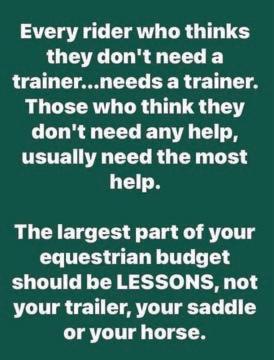
And now the rider's seat. The seat is not just the glute muscles of the rider, but the whole torso makes up the rider's seat. The rider's core/seat is to balance and follow the horse's back or top-line motion. A rider's seat is not to constrain how the horse moves. Many non ,riders think we sit on the horse and squeeze for dear life to stay on; this vice grip seat is not how it is done. A good rider sits on the horse's back and balances. A good seat is balanced side to side, allowing the horse to come through.
In addition, the seat or torso has to have two natural curvatures of the spine to absorb the horse's motion. The rider has to sit on the sitting bones of the seat, not the lower spine or the coccyx. Sitting on the coccyx rounds the rider's back, and I call this tortoise riding! Some have called it pocket riding or sitting on the pockets.
As the rider develops finesse by applying all three natural aids in unison with the horse, they will eventually use the seat for more refinement. But for the beginning rider, the seat must first learn to follow and absorb the horse's motion before influencing the horse. The best way to develop a seat is to ride bareback, so whenever a student has the opportunity, we get them on bareback. They learn to apply their aids while keeping balanced on the horse's back without leaning or collapsing when signaling the horse.
So a quick review. The rider's inside leg asks the horse to step forward, the horse's back goes through the rider's seat, and the rider's inside rein asks the horse to bend in the direction of travel (we train primarily on circles). As the inside leg keeps the momentum if needed, the rider's outside rein keeps the horse from falling in by supporting it. As if that is not enough, the rider has to learn how to apply these aids (inside leg and rein plus outside rein) without losing the balance of the seat or torso. It sounds like a lot, but this is the beginning of riding a circle on a horse. It is essential to know what you are doing and why. The learning process is as follows; first, we consciously figure out what we are doing, and then unconsciously do it. Then eventually, riding happens! ( Like learning to drive a car or play a musical instrument.)
Each of our three natural aids has a purpose, and when I became a student of classical riding, I was given a list of books and studied. In addition, as a working student, I took five lessons a week. I highlighted the books and asked questions, and it was like college! I can still quote the books today. And I am still learning, buying books, and sharing them with my students!
When I teach, I like to share the why in lessons. It is
not just do this and do that. The secret to harmonious riding is coordinating the three natural aids on the horse, and this is a perpetual undertaking for all riders. Once we master basic riding, we plateau for a little while and refine the aids as we advance.
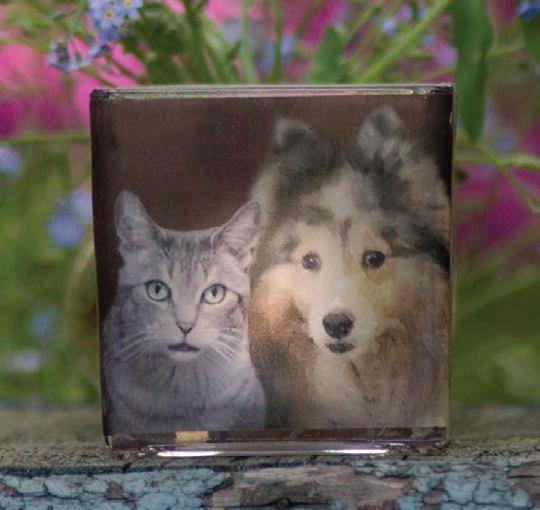


Riding is a pilgrimage; it is something that never ends. The good riders take lessons, read the books, and get on as many different horses as possible to develop a feel. Riding is a feeling you
develop with your legs, seat, and hands. You can know in your head, but you are a passenger until you can apply it physically. Finesse or coordinating the three natural aids is the secret to riding! And how do we develop that coordination? By riding!
"Riding is, therefore, an ongoing, never-ending, challenging process. That aspect makes riding so intelligent and significant an effort. One merely strives, never arrives." — Charles de Kunffy.
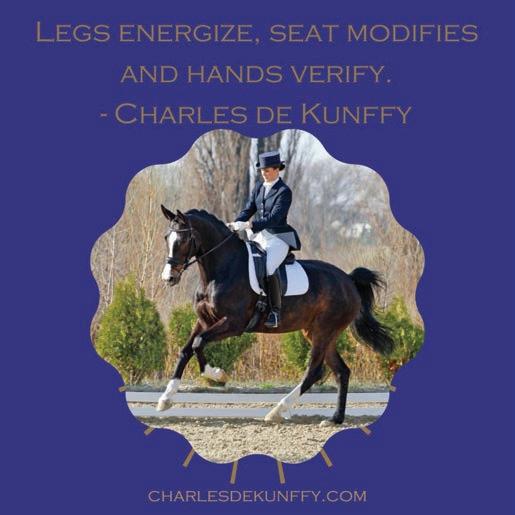
Mia was the softest and sweetest dog we ever had. She came from Boston Terrier rescue (NEBTR) 12 years ago and snuggled up to us the day she came home and never looked back. Loud noises scared her and she would hide whenever a sports game came on, especially the Steelers. Ever day she would do little dances when she knew it was dinner time or playtime. She would grab stuffies and shake them to bits but never chewed them up. Hard chews were for antlers and bully sticks. Mia loved kids and would be so gentle with them

and give lots of kisses; my nephews couldn’t wait to see her during visits often running to her before they hi to me. She was so tolerant – she didn’t have any issues with going to the vet, riding in the car or occasionally dressing up. She had very long nails when she was rescued and would let us sand them down with a dremel, asking only for some kibble in between nails. Mia loved snacks but wouldn’t eat anything that got her nose wet. A few times we put down her bowl with some tuna oil or gravy but she just looked at us until we drained it for her. Mia got along will every dog she met but would strike like a snake if they went too far. It was strange to see her so intense but still so soft. Sweet Mia. We think about you everyday. Love.
My goal and mission is to provide you with a comforting place during a very difficult time.


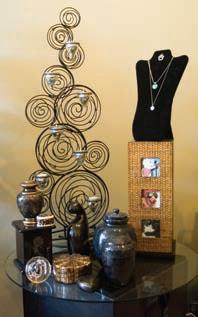


I will personally ensure that your pet is treated with respect and dignity.

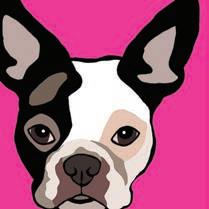
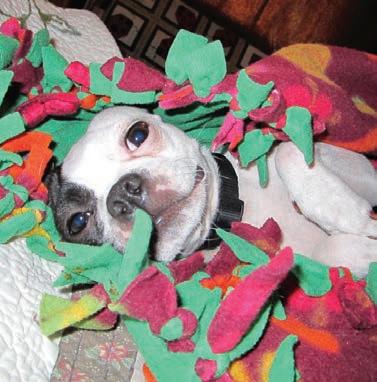
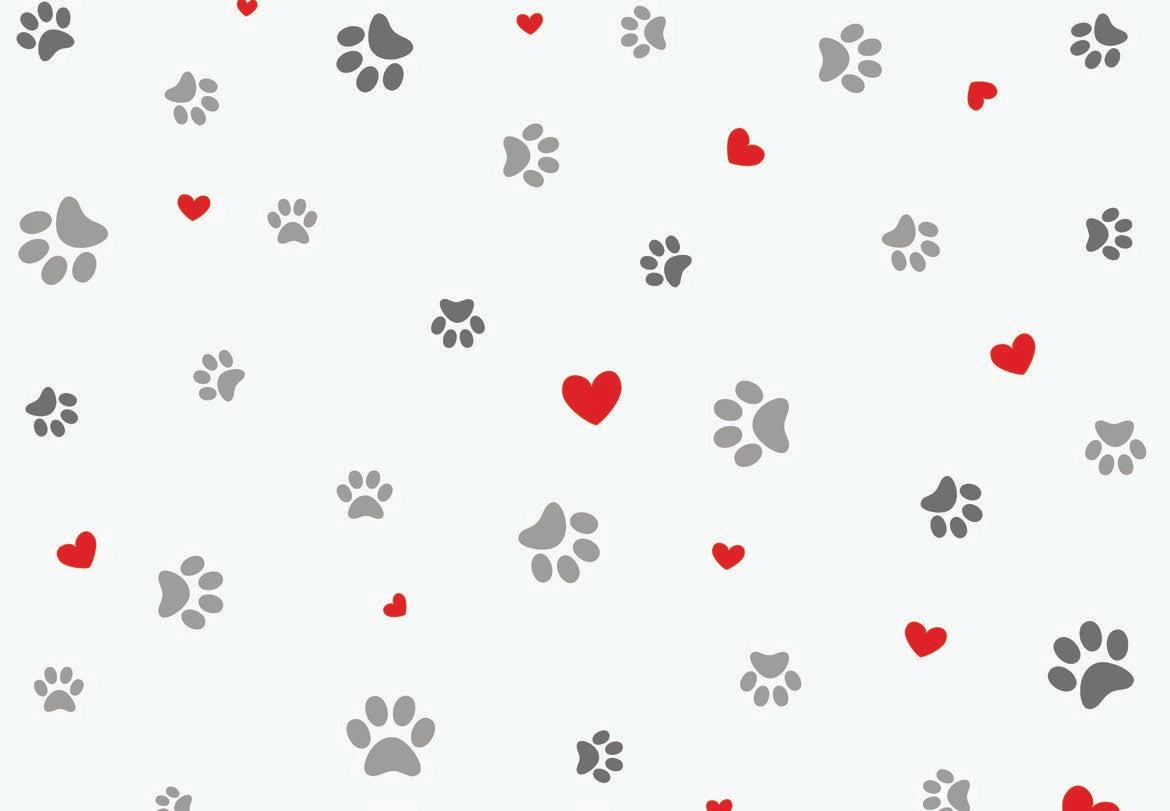
A most unique and modern garden for people and their beloved pets, Jefferson Memorial’s Garden of Faithful Friends allows your pet to stay by your side forever.
Many pet owners experience disenfranchised grief when their pet dies. Your pet was there for all the moments in your life, good or bad. As we got older, our pets did too. They loved you unconditionally. However, in the blink of an eye your animal companion is gone and you are left reeling from the loss.
For these situations, the Garden of Faithful Friends is a place where you can say farewell to your pet while never really saying goodbye. The Faithful Friends Mausoleum is an elegant visual feature that showcases artworks of people and pets, together forever.
Pet owners can purchase a single lot for their pet or purchase property within the garden for themselves to be buried with or near their beloved pet. The mausoleum houses crypt spaces for your pet, or you and your pet, to be together in eternity. In that same building are niche spaces for pet and human cremated remains. Our Pet Services include:
Pet Removal
Pet Visitation
Pet Cremation Options
Pets & Family Burial Options

Just as you can for yourself, you can prepurchase for your pet. If you have already purchased property at Jefferson Memorial and have no interments, you may transfer lots to the Garden of Faithful Friends.
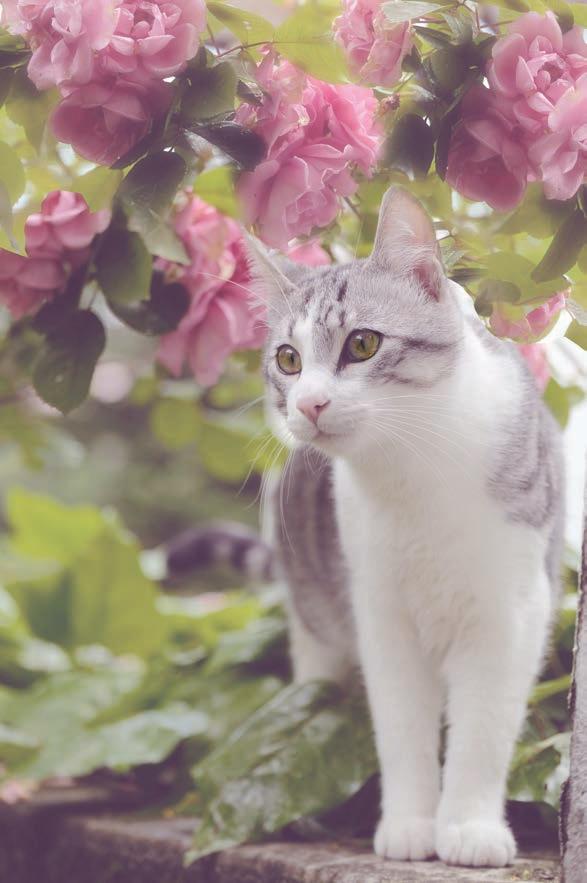
A pet who gave love and loyalty in life deserves to be memorialized in a final resting place, just as you would your human counterpart, for they too are a part of the family.
For more information on how we can help you in your pet’s time of need, please reach out to our trained professional representatives.
